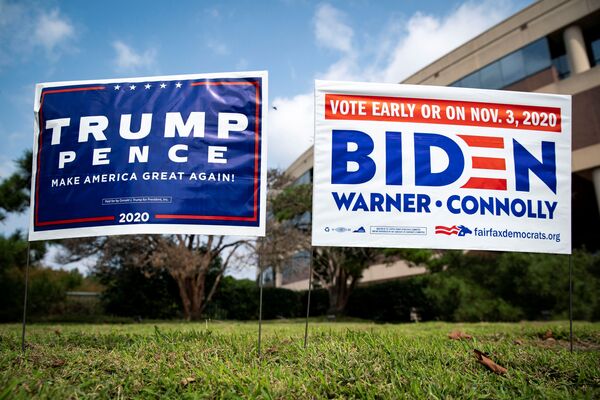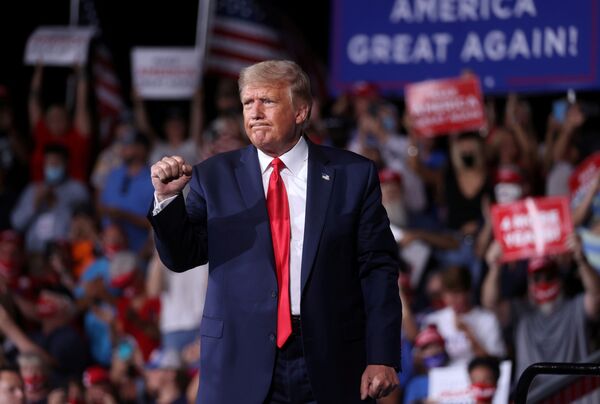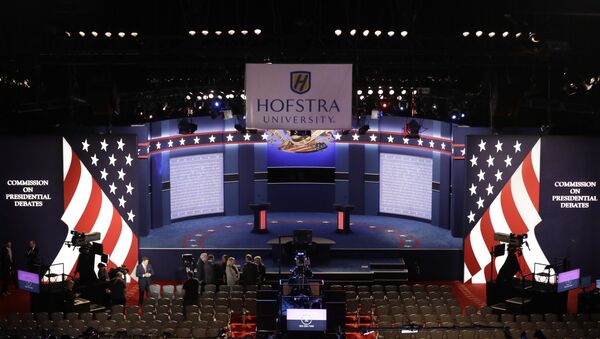Earlier in September, the nonpartisan Commission on Presidential Debates announced three moderators who will host the presidential contests: Chris Wallace (Fox News Sunday); Steve Scully (C-SPAN Networks); and Kristen Welker (NBC News). Susan Page, the Washington bureau chief for USA Today, will moderate the vice-presidential debate. According to the commission, the first and third presidential debates and the vice-presidential debate will be moderator-led, while the second event will be held as a town hall forum with, Miami area 'undecided' voters posing questions to the Republican and Democratic nominees.
However, commenting on the commission's picks, the Trump campaign has argued that some "can be identified as clear opponents of President Trump, meaning Joe Biden will actually have a teammate on stage most of the time". Previously, the Trump campaign submitted a list of 24 approved moderator candidates, but all were rejected.
How Moderators Can Influence the Political Battle
"The role of a moderator is of paramount importance", says Vladimir Golstein, associate professor at Brown University in Rhode Island. "It is the moderator who can cut off the candidate who is rambling or engaged in obfuscations. It is the moderator who can demand the candidate to answer the question that he avoids. It is the moderator who might expose the candidate as an empty windbag or as a thoughtful person. They clearly can help or harm a candidate by being friendly and easy or persistent and annoying".
While the professor believes that moderators are likely to show self-restraint, as none wants to appear blatantly one-sided or unfair, Max Parry, an independent American journalist and prolific conspiracy theorist, notes that US media almost universally favours Biden over Trump.
"With Biden's cognitive decline widely acknowledged and the Democratic Party establishment's fears about his performance expressed in Nancy Pelosi's suggestions he skip the debates altogether, [some moderators] may be forced to go to such lengths to assist him if his mental decline is as severe as it is perceived", Parry opines.
US Speaker of the House Nancy Pelosi has repeatedly urged Biden not to debate Trump, noting consistently that the president "doesn't tell the truth" which prompted further speculation about the former vice president's health and Dem concerns.
For his part, George S. Kazolias, a veteran US journalist, media trainer, and consultant, does not expect that the moderators will lob any softballs to either candidate while the whole world will be watching.
"There will only be one moderator per debate which means they should be able to stay on topic and keep the pace of moving", he presumes. "The Republicans proposed 24 names for moderators. None were chosen. The Democrats wanted a real time fact checker which was also turned down. The journalists know their beat and have most of the facts in their head already".

Who's the Toughest and Most Even-Handed Among the Moderators?
While the Trump campaign has complained of potential bias at the debates, falling short of naming names, one might ask as to how the Commission on Presidential Debates' picks could handle the shows.
"I suspect that both Chris Wallace and Susan Page would be more even-handed than Steve Scully and Kristen Welker", Golstein says. "None of them will be openly pro-Trump: it is a clear taboo in the news organisations for which they work. But these journalists are also professionals, so they would avoid open partisanship".
At the same time, he does not rule out that the moderators "would do their best to help Biden especially if he begins to show the signs of weakness or confusion, and they would surely do their best to neuter or deflect the most blunt and provocative comments of Trump".
The moderators chosen are good reporters who will ask tough questions, according to Kazolias, who singles out Fox New's Chris Wallace, suggesting that the latter "has clearly stepped into his father’s shoes as a rigorous interviewer".
Chris Wallace, a veteran anchor, is the son of famed US television news pioneer Mike Wallace, one of the first correspondents for CBS' 60 Minutes, an American television news magazine which debuted in 1968.
"Wallace was very hard on Trump in his last interview", Kazolias says, referring to the July "Fox News Sunday" show in which the anchor asked the president about the coronavirus crisis, political situation and the 2020 elections.
"Chris Wallace asks tough questions and we shall see whether he is as tough on Joe Biden as he certainly will be on Donald Trump", agrees Charles Ortel, a Wall Street analyst and investigative journalist.
The analyst drew attention to the fact that yet another tough and fair-minded moderator is Susan Page, a veteran journalist who authored a book about Barbara Bush titled "The Matriarch: Barbara Bush and the Making of an American Dynasty".
For his part, Max Parry deems that the real outlier among the aforementioned moderators is Steve Scully, from C-SPAN, who will be hosting the second debate in a town hall forum in Miami. "Scully has a reputation for being evenhanded", the independent journalist stresses.

How the Trump-Biden Debate May Affect the November Vote
Polls suggest that there are still tens of thousands of undecided voters in swing states, while "it is hard to believe there are still people sitting on the fence", Kazolias notes, alleging that these debates "could help determine how the undecided will cast their ballot".
"Swing states can go either way with just a few thousand votes", the veteran journalist highlights. "In 2016, Trump won Pennsylvania by just 44,000 votes and Wisconsin by only 23,000".
Given this, Kazolias believes that the upcoming debates "could make or break Trump’s bid for a second term".
Although it is hard to evaluate what impact some of the quick answers and memorable phrases have on the actual voting, certain comments do become iconic and can haunt the opponent or give credibility to the candidate who uses them at the right moment, presumes Golstein.
"Everyone remembers the stunning put down that Lloyd Bentsen used against Senator Dan Quayle during their 1988 Vice-Presidential debate: 'Senator, I served with Jack Kennedy, I knew Jack Kennedy, Jack Kennedy was a friend of mine. Senator, you are no Jack Kennedy'. Well, despite this memorable phrase, Bush and Quayle walked into a White House after all".
In contrast, Parry thinks that the debates won't have too much of an effect on the outcome of the 2020 election. Still, he does not rule out that Trump could score points if he were to embarrass Biden.
"Trump's daily press briefings are practically a debate every single day, he will run in circles around Biden even in light of his own recent poor performances and signs of aging himself in interviews with the media", he remarks.
No matter what effect the upcoming debates have on the election's outcome, the Biden-Trump contest will be very dramatic, not only because Americans and the entire world are living in dramatic times of pandemic and economic uncertainly, but because they are facing two highly unusual candidates, according to Golstein.
"Trump is notorious for breaking all the rules and throwing endless amounts of curveballs, and he’ll be tested on his ability to do so", the professor underscores. "But equally important is the performance of Joe Biden. His ability to withstand Trump’s charges and attacks would be crucial. If Biden fails at this task, a lot of undecided Americans would not vote for him and would either stay on the sidelines or move toward Trump".


